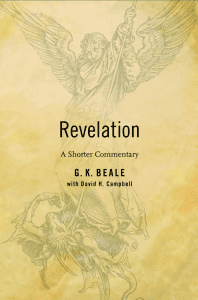What kind of book is the Book of Revelation?
We perhaps need to make something clear: The decision of what kind of book Revelation is determines how we read it, what we see in it, and what it means for our world today.
 Michael Gorman’s new book, Reading Revelation Responsibly: Uncivil Worship and Witness: Following the Lamb into the New Creation., says the book is a hybrid book: it is apocalyptic, it is prophetic, and it is a letter.
Michael Gorman’s new book, Reading Revelation Responsibly: Uncivil Worship and Witness: Following the Lamb into the New Creation., says the book is a hybrid book: it is apocalyptic, it is prophetic, and it is a letter.
What are the top three mistakes made in reading Revelation? Why are we so tempted to make the images so literal? Why the lack of poetic imagination on our part?
How can this book speak to us in the next two years as we get bombarded by political rhetoric, political rhetoric vested with the promise that a party can save the country? How does Revelation teach us to respond to such rhetoric?
The function of Revelation is “to sustain the people of God, especially in times of crisis, particularly evil and oppression.” He sees the following (and he’s right):
A scathing critique of the oppressors
Passionate exhortations to defiance
Unfailing confidence in God’s ultimate defeat of the present evil.
There are dualisms here: cosmic (two opposing forces at work; think Star Wars), historical (children of God, children of darkness), ethical (choose sides), temporal (now and the Age to Come), and a dispositional dualism: pessimism and optimism.
It is filled with colors (which are images) and numbers (which are adjectives)!
Yet, this book is filled with non-literal images of the real world, and the problem in interpreting is that too many think of the images as real and therefore literal. It depicts real world things with utterly unreal images. It draws on the prophetic literature of the Old Testament in order to comfort and challenge the people of God — at that time.
It’s goal is not speculative foresight but theological insight. It reveals that the Empire will come down, the Lamb will be exalted, and the people of God are to be faithful.
Ultimately, it is resistance literature and it is a pastoral letter to real churches who needed to have their imaginations converted from fear of the Empire to the Victory of the Lamb who will guide us into the Age to Come.
Here is a great text to sample this sort of reading of the book, from Revelation 18:
18:1 After these things I saw another angel, who possessed great authority, coming down out of heaven, and the earth was lit up by his radiance. 18:2 He shouted with a powerful voice:
“Fallen, fallen, is Babylon the great!
She has become a lair for demons,
a haunt for every unclean spirit,
a haunt for every unclean bird,
a haunt for every unclean and detested beast.
18:3 For all the nations have fallen from
the wine of her immoral passion,
and the kings of the earth have committed sexual immorality with her,
and the merchants of the earth have gotten rich from the power of her sensual behavior.”
18:4 Then I heard another voice from heaven saying, “Come out of her, my people, so you will not take part in her sins and so you will not receive her plagues, 18:5 because her sins have piled up all the way to heaven and God has remembered her crimes. 18:6 Repay her the same way she repaid others; pay her back double corresponding to her deeds. In the cup she mixed, mix double the amount for her. 18:7 As much as she exalted herself and lived in sensual luxury, to this extent give her torment and grief because she said to herself, ‘I rule as queen and am no widow; I will never experience grief!’ 18:8 For this reason, she will experience her plagues in a single day: disease, mourning, and famine, and she will be burned down with fire, because the Lord God who judges her is powerful!”











